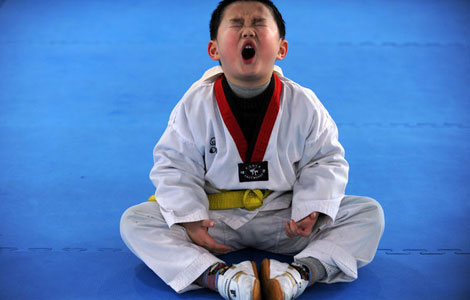Consumers, how can I make you trust me?
Updated: 2012-01-12 14:27
By Song Jingli (chinadaily.com.cn)
|
|||||||||||
With recent food scandals plaguing the food industry, skeptical Chinese consumers are naturally inclined to question the credibility of many brands. As a result, companies are finding it increasingly difficult to gain consumer trust.
Beijing Shijia Commercial Trade Co Ltd, an organic food producer, is one of the businesses that consider themselves trustworthy but are struggling to find people that believe them.
Li Hongshan, founder and general manager of Shijia, said that although their organic rice has been certified by one of the 23 authorized certification institutions in China, there's still a long way to go before gaining recognition by the public.
Li, who has shifted focus from his accessories export business in Russia, is now running a 1,800 mu (120 hectares) organic rice-planting farm. He rented the land in his hometown from the government of the Minle Korean town, Wuchang city, Heilongjiang province.
He said he gained inspiration from Russia's lifestyle and thought his honest personality would allow him to set up "his own business" in China's food industry.
"But it's really, really hard in a time when people habitually show mistrust toward the whole food industry," Li said.
He said his company has stationed two employees in Minle to monitor and make sure their cooperating partners, 12 local farmer households, plant rice according to their instructions. Employees also ensure that harvested organic rice does not get mixed with non-organic foods in the processing plants, a practice that is not uncommon.
Li has even sent sample products, which hold "organic food" certification from Pony Testing International Group, to a personal friend working in a food quality inspection organization in Inner Mongolia, asking him to test for fertilizers or pesticides. The results showed that the product was pure, he said.
"But how can I tell potential customers that we have done all these honestly?" he asked.
"We cannot invite every customer to our farm to see and follow each procedure, it will be too expensive," he added.
Zhang Wei, assistant to Li, said, "It's even hard for big brands to gain trust from the public, how can a newly-set brand manage to do so?".
Zhang, responsible for developing sales channels, said he felt a prevailing "mistrust" and scrutiny when applying to sell their products in supermarkets or online stores as they often conduct strict and lengthy assessments of the products.
Zhang said they may try to persuade some communities in Beijing or Shanghai to let them send the rice directly there. "If we can get trust from one community, we can get trust from more," Zhang said.
He explained that this will also cut the cost of organic food, making it less of a luxury purchase.
- Saudi oil refinery deal shows close ties
- Olympic venues face financial woes
- Shoemakers head home for profits
- Having bottle to invest in red wine
- China considers expanding RQFII program: report
- Weather puts rail system to test
- Crucial year looms for global economy
- In love with luxury amid global gloom








